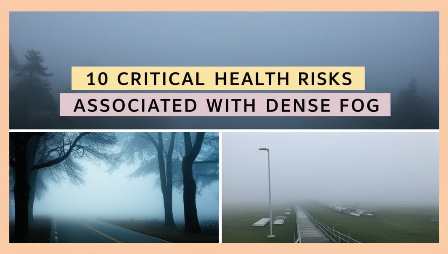Dense fog may have a charming appearance, but it conceals significant risks. Fog may have major effects on our health; therefore, it’s critical that we acknowledge these hazards.
Because of the pollutants in the atmosphere, fog has the potential to cause a variety of health problems.
As winter progresses, fog is becoming more prevalent. These days, everyone should be mindful of their health. A little negligence might ruin your health.
Experts recommend including soups, spicy foods, and seasonal fruits and vegetables in your diet. Additionally, ensure adequate protection whenever you venture outside.
Wearing sweaters and woolen clothing minimizes the chance of getting a cold. Especially if someone is leaving the home during fog, he should exercise extreme caution. If you don’t take this precaution, you may experience certain health issues.
The ten critical health risks associated with dense fog are listed below:
1. Dense fog may trigger colds and coughs.
Only when the cold temperature rises excessively does fog form. If you do not maintain a healthy lifestyle and eat well, you may get a cold and cough as a result of the increased fog.
Actually, breathing in fog exposes our lungs to chilly air. This amplifies the burning feeling and chilly effect in the lungs. This is why venturing outside in fog intensifies the symptoms of colds and coughs.
2. A sensation of suffocation brought on by dense fog
You might be surprised to hear that fog can make some people feel suffocated. Sometimes air contaminants dissolve in fog. These toxins enter our lungs while we breathe, causing them to shrink.This disorder leads to breathing difficulties, ultimately resulting in asphyxia. Is it possible for fog to instill a sense of tranquility while simultaneously hindering breathing?
3. Eye discomfort may occur due to fogging.
Pollution mixing introduces nitrogen dioxide into the foggy air. When we leave the home, this air also comes into contact with our eyes. Contact with any form of pollution causes increased eye discomfort or watering.
If the air quality improves despite the fog, this sort of difficulty will decrease.
4. Arthritis pain may be increased.
It goes without saying that cold increases bone discomfort. The chill in fog may exacerbate arthritic or joint discomfort.Experts think that when the fog grows, people’s physical activity decreases. In such cases, joint stiffness and discomfort worsen.
5. May cause depression.
Many individuals suffer from a seasonal affective disorder during the colder months. The fog may exacerbate this issue. Actually, dim light causes some individuals to become depressed for no apparent reason.
On cloudy days, there is less sunlight and less physical activity. In such cases, the individual isolates himself inside the home, which might lead to depression.
6. Vulnerable Populations: Protection for the Elderly and Children
Children and the elderly are particularly vulnerable to the harmful effects of thick fog. It is critical to protect their safety during the fog season by providing sufficient care, monitoring, and help to avoid health concerns.
7. Walking on waterways can pose marine hazards in strong fog conditions.
Fog poses particular problems to marine navigation, necessitating additional safety precautions and processes to avoid mishaps at sea. Low visibility makes it harder for ships to notice and avoid each other, increasing the likelihood of a collision.
Even with radar and other navigation aids, there may not be enough time to respond and prevent a collision.
8. Skin sensitivity:
Moisture-laden fog may irritate the skin, particularly for people with sensitive or dry skin. Prolonged contact may cause skin irritation, itching, or exacerbate pre-existing skin conditions.
Fog causes high humidity, which keeps the skin wet for a long period. Prolonged contact with moisture may irritate the skin, particularly in those with sensitive skin or pre-existing skin diseases like eczema or psoriasis.
Fog causes high humidity, which keeps the skin wet for a long period. Prolonged contact with moisture may irritate the skin, particularly in those with sensitive skin or pre-existing skin diseases like eczema or psoriasis.
9. The terrible reality of road accidents caused by fog.
The results present a bleak picture of the relationship between severe fog and increased road accidents. Low visibility causes unforeseen risks on the road, highlighting the need for careful driving.
It is vital to promote sophisticated safety measures in automobiles in order to lessen the frequency and severity of accidents in foggy circumstances.
10. Does Dense Fog Affect Heart Health?
The presence of fog has no direct impact on cardiovascular health. However, thick fog is often associated with certain climatic conditions, such as low temperatures and high humidity, which may impact some people’s cardiovascular health.
Extreme weather changes may put a strain on the body, possibly harming persons with heart disease or raising the risk of cardiac issues.
Furthermore, poor visibility in foggy situations can lead to stressful conditions, which may have an indirect influence on cardiovascular health, particularly for individuals prone to stress-related cardiovascular disorders.
FAQs about Health Problems Caused by Dense Fog:
1. What is the source of the fog?
Fog refers to fog that has penetrated to the ground level. Fog density may range from thin to thick. People can’t see very far due to the fog. The fog also has an impact on health. Problems worsen, particularly for asthmatic people.
2. Can fog create health issues?
In general, fog has no negative health effects. If fog contains air contaminants, indicating poor air quality, it may have a negative impact on health. People with respiratory difficulties, in particular, may suffer from poor health.
3. How does thick fog influence respiratory health?
Yes, thick fog may exacerbate respiratory issues since it contains chemicals and allergens that can make breathing harder.
4. Does fog induce skin irritation or allergies?
Prolonged contact with moist fog conditions may enhance skin sensitivity or trigger allergy responses in certain people.
5. Is it safe to drive or travel in strong fog?
Driving in severe fog can be risky due to limited visibility, which increases the likelihood of an accident. It is advisable to limit travel or use care.
6. Does fog create eye irritation or problems?
Fog may include particles that irritate the eyes, causing pain or temporary vision loss in some persons.
7. How does fog affect heart health?
While fog may not have a direct impact on heart health, harsh weather circumstances such as fog may impose pressure on the body, possibly hurting patients with heart disease.
8. Does fog create headaches or migraines?
For certain people, variations in air pressure and environmental circumstances like fog may cause headaches or migraines.
9. Is there any danger of illness during the foggy season?
Fog cannot directly cause illness, but the damp circumstances it creates may promote the development of some infections or molds.
10. Can fog exacerbate existing respiratory diseases such as asthma?
Yes, the high humidity and possible contaminants in fog may exacerbate asthma symptoms in susceptible persons.
11. Are there any psychological impacts of foggy weather?
Some individuals may suffer mood swings or sensations of restlessness as a result of the gloomy environment caused by low sunshine and fog.
12. How does fog affect overall health in the long run?
The long-term impacts of fog on health are associated with recurrent exposure to the pollutants or allergens involved, which may impact your respiratory or skin health over time.
Dense fog causes several health hazards, impacting all areas of well-being. Primarily, it raises significant concerns about respiratory health due to the presence of pollutants and allergens, which can lead to serious illnesses like asthma. Furthermore, fog heightens the risk of traffic accidents due to its reduced visibility, thereby increasing the road’s hazards.
Furthermore, despite having no direct effect on cardiovascular or heart health, the combination of low temperatures and high humidity under foggy situations might render people more susceptible to cardiovascular disorders. Overall, recognizing the intricacies of thick fog-related health issues stresses the crucial need of taking care and raising awareness to minimize its negative consequences.

